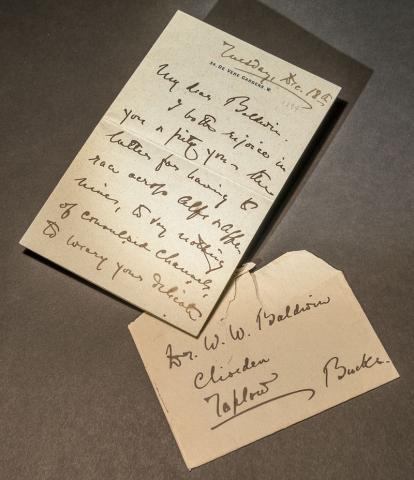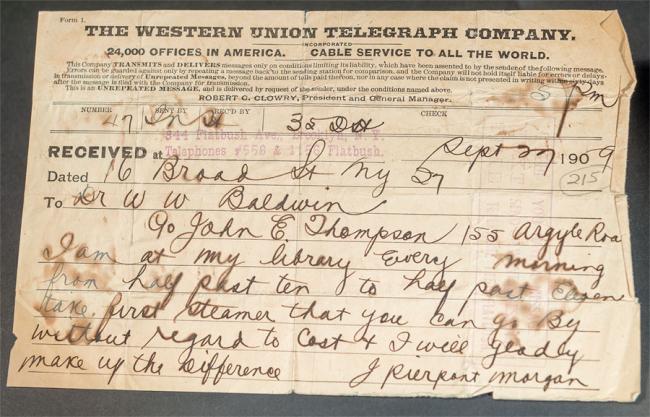This past summer I spent some time researching the Morgan’s collection of manuscripts and letters by Henry James for an essay to be published next year in the book accompanying the exhibition Henry James and American Painting. This book also includes extensive essays by my co-curator, the novelist Colm Tóibín, and art historian Marc Simpson.
Pierpont Morgan did not actively collect Henry James’s work and there is little to suggest that he read any of the author’s novels and stories. But, as near contemporaries—Morgan was born only six years before James—I was on the lookout for anything that connected the financier and the novelist. Or evidence that they may have met each other (I didn’t find any).
The most extensive collection of letters by Henry James in the collection of the Morgan Library & Museum were written to Dr. William Wilberforce Baldwin (MA 8732.1-75). This collection, comprising sixty-nine autograph letters, three typed letters and two telegrams, was donated in 1968 by Dr. Baldwin’s daughters, Cornelia Thayer Baldwin Lane and Margaret Elizabeth Baldwin Hawks. Their father, Dr. Baldwin (1850–1910), was an internationally renowned American physician specializing in cardiology. He set up a practice in Florence in the 1880s and was physician to many famous individuals. Among some of his royal patients were Queen Victoria, her daughter-in-law the Princess of Teck (who later became Queen Mary), and the Duchess of York and her family.
He also attended to the medical needs of the expatriate American community in Italy, and the many distinguished Americans who passed through the country on their European travels. Among his famous American patients were Mark Twain and his wife Olivia, Edith Wharton, William Dean Howells, Constance Fenimore Woolson, Henry, William, and Alice James, and . . . to my pleasant surprise . . . Pierpont Morgan.
Doctor Baldwin was regarded as a brilliant diagnostician and correctly diagnosed Alice James’s cancer in 1891. Writing to his brother William on July 31 that year, James described Dr. Baldwin as “very ‘live’—clever, intelligent and ingenious and remarkable in his way; and, as a good friend of mine, has taken an added interest in her [Alice James], besides having evidently been most careful and attentive. He appears to have been almost the only doctor that she has ever liked to see.” Baldwin also diagnosed and treated William James’s heart disease in 1899. The biographer Leon Edel believed that Dr. Baldwin was the model for the character Sir Luke Strett in The Wings of the Dove (1902).
James’s letters to Dr. Baldwin (more than 400-pages) span the years 1887 to 1907, during which time Pierpont Morgan also consulted the physician. The novelist sometimes worried about the strain of the doctor’s workload. On December 18, 1894, he told Baldwin: “I both rejoice in you & pity you - the latter for having to race across Alps & Appenines, to say nothing of convulsed channels, to weary your delicate flesh & to please bloated Billionaires” (MA 8732.54). James may have had in mind the William Waldorf Astor and his family.
The Morgan Library & Museum has two autograph letters and eleven telegrams from Pierpont Morgan to Dr. Baldwin, written between April 14, 1905, and March 22, 1910 (MA 8739). Mr. Morgan enjoyed a professional and social relationship with Baldwin; the physician was invited to spend time on Morgan’s yacht The Corsair, when it was anchored in Venice. In 1905 in Rome Mr. Morgan wrote a check in the amount of $2,000 for Baldwin’s medical services [that’s over $50,000 in terms of relative value in 2016]. A revealing insight into the closeness of Mr. Morgan’s relationship with Baldwin is provided by his urgent telegram of September 27, 1909, that reads: “I am at my library every morning from half past ten to half past eleven. Take first steamer that you can go by without regard to cost & I will gladly make up the difference” (MA 8739.12).
So, although it appears that Pierpont Morgan and Henry James never met each other, for several years they both enjoyed the friendship and company—as well as the expert medical attention—of the same famous physician.
The Leon Levy Foundation is generously underwriting a major project to upgrade catalog records for the Morgan's collection of literary and historical manuscripts. The project is the most substantive effort to date to improve primary research information on a portion of this large and highly important collection.


